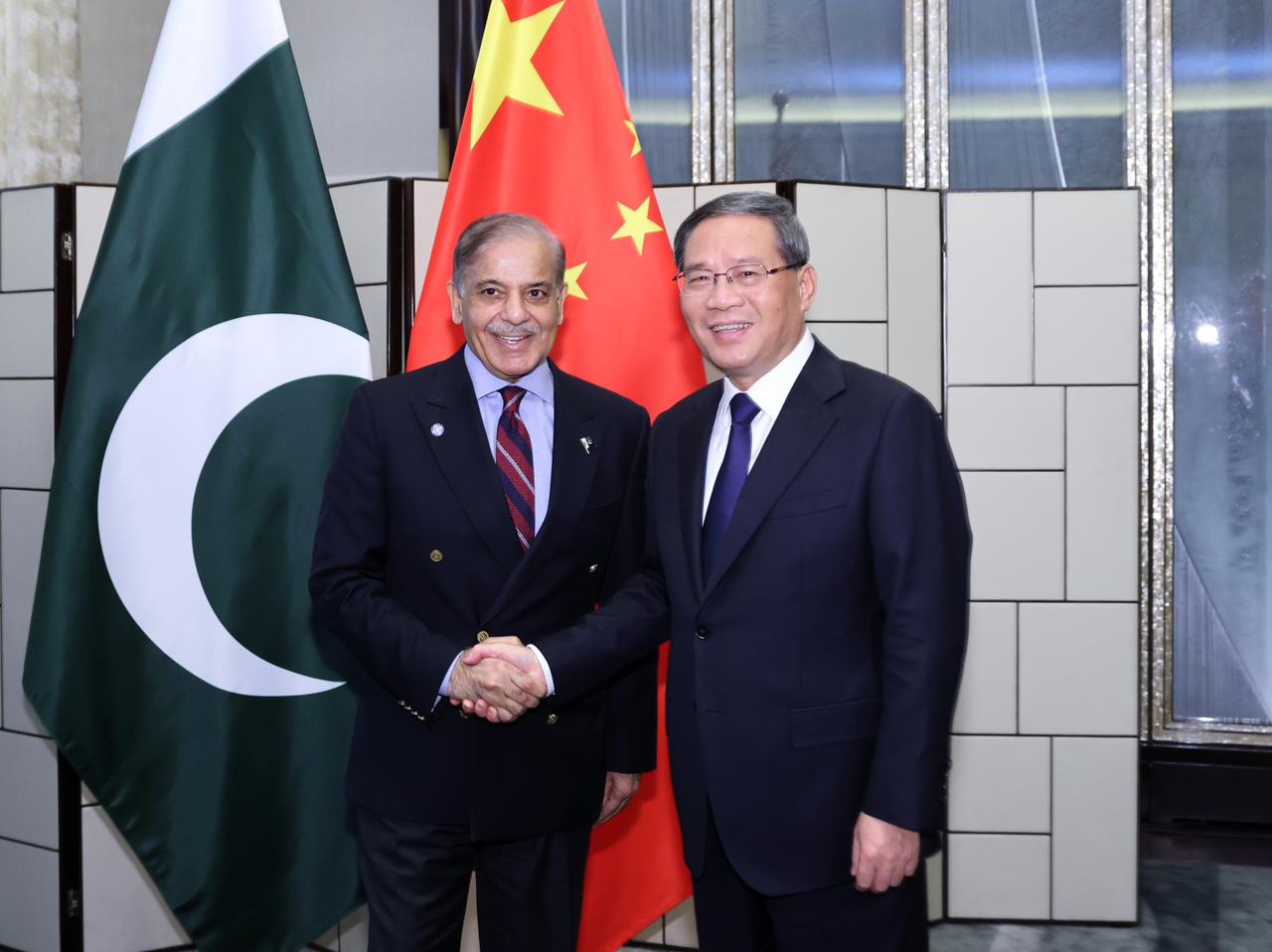

Pakistan Prime Minister Shehbaz Sharif with Chinese Premier Li Qiang (Photo: PakPMO/Twitter)
Even as Pakistan is celebrating the 10-years of the China-Pakistan Economic Corridor (CPEC), issues dog the “game-changer” project that falls under China’s ambitious Belt and Road Initiative (BRI).
Chinese Premier Li Qiang once again reminded Prime Minister Shehbaz Sharif to effectively tackle all types of domestic terrorist organisations and provide safety to Chinese institutions and personnel. The venue he chose was Paris, France, where world leaders have assembled for discussions on the New Global Financing Pact.
Chinese State-owned media, Global Times reported that Li asked Sharif in Paris China hopes “the Pakistani side will resolutely and effectively crack down on all types of domestic terrorist organizations, and ensure the safety of the Chinese institutions and personnel in Pakistan”.
Attacks on Chinese institutions and people employed in the South Asian nation has become an embarrassing point for Islamabad as this point has been raised repeatedly by Beijing at the highest levels of bilateral talks between diplomats, ministers and the heads of State.
Sharif told Li that the two nations are “all-weather friends and iron-clad brothers”, adding that Pakistan will make every effort to provide security to Chinese personnel and institutions in Pakistan.
However, it is not just top Chinese officials but even Chinese managers who are complaining about security. Recently, Yu Bo, chairman of the China Overseas Port Holding Company (COPHC) said the biggest difficulty in making the Gwadar Port functional is “security precariousness”. This is despite the fact that Pakistan created a Special Security Division (SSD) in 2016, just three years after the birth of CPEC in July 2013, for exclusive security at Gwadar, where China is building a multi-purpose port.
This is the umpteenth time that Beijing has asked Islamabad to ensure safety and security for its nationals working on large-scale projects across Pakistan. China has invested upto $48 billion of a total of $64 billion in the project. On the other hand, Pakistan is not even making payments to the Chinese companies for producing power.
Chinese companies have even accused the Pakistan government of defaulting on payments after the country withheld billions of dollars in dues to the Port Qasim Electric Power Company and Engro Powergen Thar Ltd.
Some of the problems haunting CPEC are peculiar to Pakistan.
In April this year, a Chinese national working on the Dasu hydropower project on the Indus river was almost lynched by workers on allegations of blasphemy. The engineer had reportedly complained to workers about the slow pace of work during Ramadan. As information spread about his comments, workers and villagers attacked the Chinese workers’ camp and pelted stones. The engineer had to be airlifted to safety by troops and was evacuated to China after the police filed cases against him.
With violence rising in a chaotic Pakistan, China had recently shut down its consular section in its embassy in Islamabad. Sweden, in fact, closed its Islamabad embassy indefinitely in April due to security concerns.
Despite the feeble promises that the Pakistani political and military leadership has been making to China, the reality is that there is a massive anti-China sentiment among the Baloch, Sindhis and other ethnic people. Added to this are armed groups like the Balochistan Liberation Army (BLA), the Baloch Raji Ajoi Sangar (BRAS) alliance and even the Taliban that target Chinese nationals as well as CPEC projects in Khyber Pakhtunkhwa, Balochistan and Sindh.
Promising additional security to CPEC might be a tall order for Islamabad as its forces are currently fanned out in large parts of the country in counter-terrorism operations and battling ethnic insurgencies. Its border with Afghanistan and Iran too have witnessed numerous clashes where many Pakistani soldiers have lost lives.
Life in Jammu and Kashmir's Reasi returned to normal after India and Pakistan came to…
Union Minister Pabitra Margherita was the guest of honour at the 146th Girmit Day celebrations…
As India and the United Kingdom successfully conclude their Free Trade Agreement (FTA), it has…
During his visit to Amherst, Sikyong engaged with Tibetan youth, emphasising the geopolitical and environmental…
Taiwan's Ministry of National Defense (MND) said it detected 31 Chinese military aircraft, seven naval…
Hitting out at Pakistan over its support to cross-border terrorism, Prime Minister Narendra Modi on…